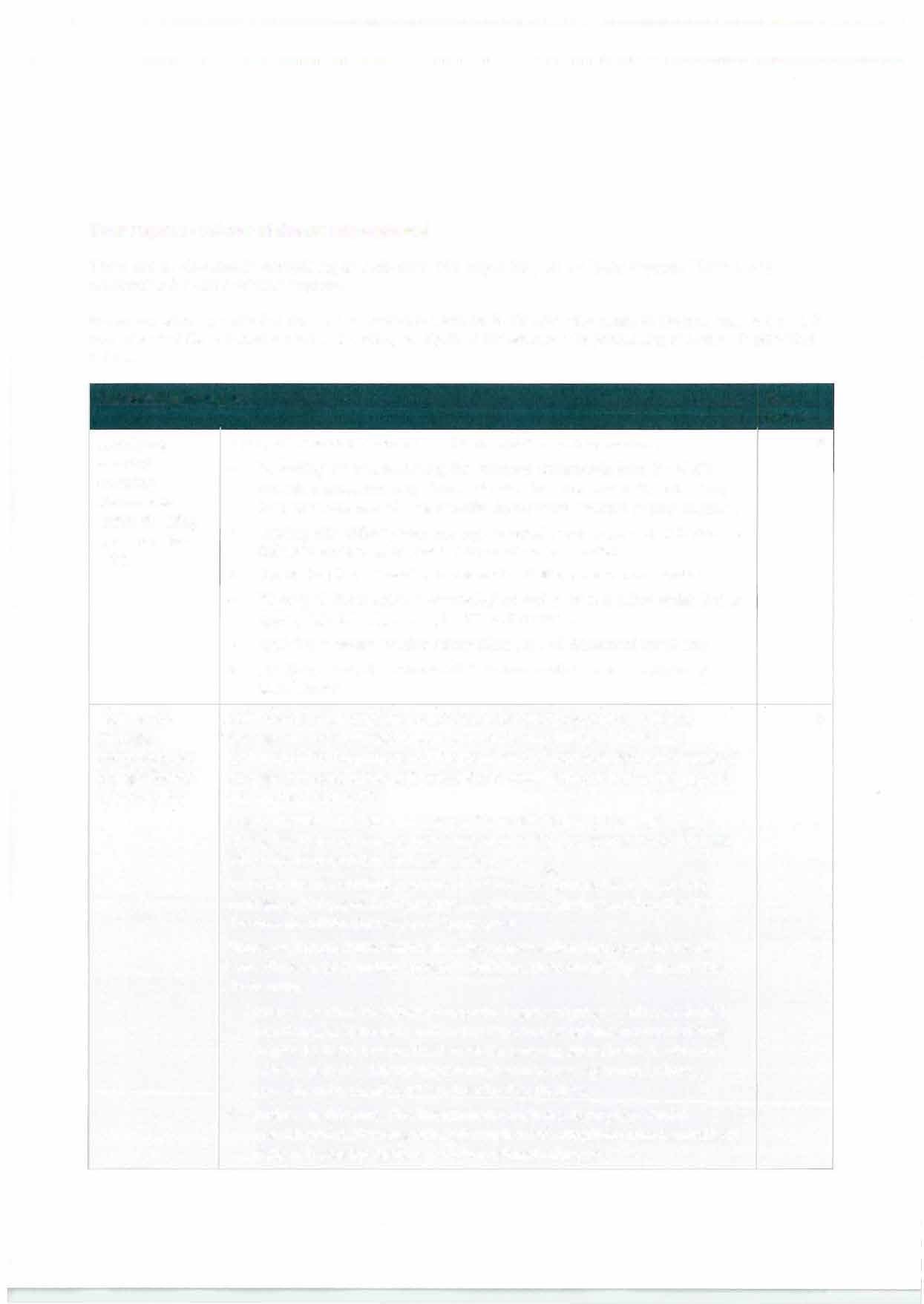

 Australian Government
Australian Government
Office of the Special Investigator
OSI reference: FOl24/15; ACON24/30
3 October 2024
Mr James Smith
By email: xxxxxxxxxxxxxxxxxxxxxxxxxx@xxxxxxxxxxx.xxx.xx
Dear Mr Smith
Freedom of Information Request FOl24/15 - Request consultation
This letter seeks information about your request for access to documents under the
Freedom of Information
Act 1982 (FOi Act) which you submitted to the Office of the Special Investigator (OSI).
Background
All correspondence for this matter is available on line at the Right to Know webpage for this request1. A
summary is provided at
Attachment A.
Scope of your request
Your request - as revised on 19 September 2024 - is currently for:
1. The agendas and minutes of the OS/'s Executive Board and Audit and Risk Management
Committee (ARMC) meetings.
a. final versions of the agendas and minutes (i. e. no drafts are requested)
b. only documents created between 1 July 2023 to date
2. Training presentations and lecture notes, slides or handouts:
a. given by Mr Mark Weinberg, Mr Chris Moraitis, Ms
Helen Daniels or Mr Ross
Barnett.
b. final versions of documents (i.e. no drafts are requested)
Practical refusal reason
I am authorised to make decisions in relation to FOi requests received by the OSI.
I have decided the OSI is still authorised to refuse access to your request because, in its current form, the
work involved in processing it would substantially and unreasonably divert the resources of the OSI from its
other operations. This is called a 'practical refusal reason' under s 24AA of the FOi Act.
1 https://www.righttoknow.orq.au/reguest/osi board committee and presenta
GPO Box 812, Canberra ACT 2601
Telephone: 1300 112 494 • website www.osi.gov.au

 Your request - volume of documents captured
There are 20 documents comprising an estimated 101 pages for part 1 of your request. There are nil
documents for part 2 of your request.
Based on advice provided to me, I conservatively estimate it will take 71.5 hours to process your request. A
breakdown of the estimated processing time, categorised by reference to processing resource, is provided
below.
Processing resource
Est.
hours
Identifying,
This part of work for your request is complete and has involved:
9
locating or
Your request - volume of documents captured
There are 20 documents comprising an estimated 101 pages for part 1 of your request. There are nil
documents for part 2 of your request.
Based on advice provided to me, I conservatively estimate it will take 71.5 hours to process your request. A
breakdown of the estimated processing time, categorised by reference to processing resource, is provided
below.
Processing resource
Est.
hours
Identifying,
This part of work for your request is complete and has involved:
9
locating or
•
Searching for and retrieving the relevant documents from the OS I's
collating
records management system. This also involved manually extracting
documents
from omnibus records the specific documents relevant to your request.
within the filing
•
system of the
Liaising with officers who manage relevant records as part of their core
OSI.
duties to ensure all relevant documents were located.
•
Converting the relevant documents to .PDF format where required .
•
Placing all documents in chronological order, or in another order that is
appropriate for responding to this FOi request.
•
Applying relevant header information (eg FOi document numbers) .
•
Inputting relevant document details into a schedule for preliminary
assessment.
Assess the
This work is not complete. To project estimated processing, a timed
3
relevant
assessment of a sample of the relevant documents was previously
documents for
undertaken for the purpose of the first round of consultation. As a result of
the application
that assessment, it was estimated that it would take 2 minutes per page to
of exemption.
assess the documents.
I have reused the above assessment to estimate the processing time,
noting the sample remains representative of the documents which remain
within the scope of this revised request.
As such, I conservatively estimate that it would take at least 3 hours (2
minutes x 101 pages) to complete a preliminary assessment on the 20
documents within the scope of the request.
However, I expect this estimate could increase due the complexity and
breadth of subject matter covered within the documents. Specifically, the
documents:
•
Still cover all of the OS I's corporate, legal and policy and operational
functions, and are not confined to a particular subject-matter or issue.
Topics include, but are not limited to, investigations work, health and
safety, security, risk management, records management, privacy,
operational updates and legal and policy matters.
•
Include highly sensitive information which would require careful
consideration. For example, information affecting law enforcement and
national security, defence or international relations.


 Consultation
Based on a review of the documents currently within scope, the OSI would
25.5
with third parties need to consult the following third parties in processing your request:
Consultation
Based on a review of the documents currently within scope, the OSI would
25.5
with third parties need to consult the following third parties in processing your request:
•
Ten Australian Government agencies and departments or authorities of
the Commonwealth.
•
Two entities required to be consulted under s 27 of the FOi Act
(business information).
•
Five individuals required to be consulted under s 27 A of the FOi Act
(personal information).
I estimate it would take 1.5 hours to complete each third party consultation,
having regard to:
•
The time involved with preparing correspondence and document packs
for each third party - there are several third parties who would need to
provide views on several of the documents.
•
Answering enquiries the third parties may make during the consultation
process.
•
Considering any final submissions the third parties make to the OSI
and, if required, updating the relevant documents accordingly.
Deciding
This involves:
31
whether to
•
Preparing a draft decision, statement of reasons and a finalised
grant, refuse or
schedule of documents (3 hours).
defer access.
•
Relevant internal areas and officers with necessary subject-matter
expertise reviewing the draft decision and relevant documents. In this
case, 7 OSI areas would be required to review the documents and
provide input (3 hours per area =
21 hours).
•
Final review decision-making on the request by an OSI authorised
officer (7 hours). A decision-maker must consider in detail the terms of
the FOi request, relevant provisions of the FOi Act and the FOi
guidelines, the content of the relevant documents, as well as input from
third parties and internal OSI work areas.
Redacting
This involves redacting identified material per the decision-maker's decision
2.5
exempt material and a range of other administrative tasks, such as:
from the
•
Ensuring appropriate metadata and security controls are placed on the
documents and
documents as required, and that relevant footer information is also
notifying you of
included.
an interim or
•
final decision
Manually applying a strikethrough on all classification markers that
and preparing
appear in the documents to be disclosed.
any relevant
•
Preparing and seeking clearance of the correspondence enclosing the
documents for
final decision and attachments notifying you of the decision on your
disclosure.
request.
Total hours
71.5

 Other matters I have considered in deciding whether a practical refusal reasons exists
In line with the FOi Guidelines
Other matters I have considered in deciding whether a practical refusal reasons exists
In line with the FOi Guidelines2
published by the Information Commissioner under s 93A of the FOi Act, I
have considered other factors in deciding whether a practical refusal reasons exists in relation to your
request. These factors are detailed below.
The staffing resources available to the OSI for FOi processing
The OSI has one staff member dedicated to processing FOi requests on a day-to-day basis. However, FOi
reiated work is one part of their role. Other duties include records management and privacy-related work.
In your email of 19 September 2024, you referred to the OS I's FOi delegations3
and advised ' ... it is not a
reasonable excuse to refuse access to the documents requested on the basis of staffing where the OSI must
have enough staff available to handle FOi requests.'
In line with paragraph 3.13 of the FOi guidenlines, the OSI has taken steps to ensure that a sufficient
number of officers are authorised at appropriately senior levels to make decisions on FOi requests received
into the agency. However, FOi decision-making by these staff is undertaken in addition to their day-to-day
duties which are unrelated to FOi work.
Whether the processing work requires the specialist attention of a senior officer, or can only be undertaken
by one or more specialist officers in an agency who have competing responsibilities
Due to the breadth and complexity of the documents sought, it is anticipated that processing this request
would require:
• Review and input from 7 OSI areas, including staff with specialist expertise in ICT, finance, legal and
policy, risk, security, governance and operational matters. Staff in these areas have competing priorities,
including duties which are central to the purpose for which the OSI was established.
• The decision to be made by a senior member of OSI with oversight and/or knowledge of the matters
concerned. This is due to the broad scope of subject-matter contained within the documents and the
sensitive nature of some of the information.
The impact that processing a request may have on other work in the OSI, including for FOi
All of the OS I's corporate and legal and policy functions are supported by a small cohort of staff; not more
than 20.
I consider that processing a request of this scale and breadth would substantially and unreasonably divert
the resources of the OSI from its other priority operations. The OSI was established by Executive Order for a
specific purpose4
and it is essential that as a temporary agency, it remains focused on delivering its mandate
in the limited time available.
2 Paragraph 3.117, https://www.oaic.qov.au/freedom-of-information/freedom-of-information-guidance-for-government-agencies/foi
quidelines
3 Information regarding the delegations were included in a document released to you by the OSI on 19 September 2013 in response to
FOI24/13 - See: https://www.riqhttoknow.orq.au/request/osi foi known materials#incominq-37099
4 https://www.osi.qov.au/about/our-purpose

 Specifically, processing this request in its current form would substantially and unreasonably:
• Impact the OS I's ability to process and respond to other FOi requests in a timely manner.
•
Impact other OSI business areas ability to deliver on their work by diverting staff from their priorities. This
could compromise the OS I's ability to deliver on a range of outcomes and requirements. For example
Specifically, processing this request in its current form would substantially and unreasonably:
• Impact the OS I's ability to process and respond to other FOi requests in a timely manner.
•
Impact other OSI business areas ability to deliver on their work by diverting staff from their priorities. This
could compromise the OS I's ability to deliver on a range of outcomes and requirements. For example
external reporting required by other Australian Government agencies and the Parliament, as well as
deadlines imposed by legal and other processes.
Whether an applicant has cooperated in framing a request to reduce the processing workload
The OSI acknowledges you have sought to revise the terms of your request and that fewer overall
documents have been captured as a result. However, the date range and/or breadth of the subject-matter
covered within the documents remains an issue, and the OSI has suggested on several occasions that you
focus your request to be for documents about a topic or issue, or to documents authored by particular areas
of the OSI.
Whether there is a significant public interest in the documents requested
I acknowledge there may be substantial public interest in the OSl's functions and activities. However, the
sensitive and singular focus of the OS I's work necessarily places limits on the amount of information the OSI
is able to release publicly while investigations are ongoing. This also ensures the OSI is able to continue
working with key partners to:
• Investigate possible breach(es) of the criminal law relevant to the OSl's remit.
• Fulfil its core purpose in the manner expected by the Government.
Request consultation process
Before I make a decision to refuse your request, s 24AB of the FOi Act requires a 'request consultation
process' (see FOi Act extracts at Attachment B). Under this request consultation process you have 14 days
commencing the day after you are given this letter to do one of the following:
• Withdraw your request.
• Revise your request in writing.
• Tell us in writing you do not want to revise your request.
Further information about each of these options is below.

 Withdraw your request
It is open to you to tell us in writing that you want to withdraw your request.
Your request will be finalised as withdrawn if you do not respond to this letter by providing a revised request
or telling us you do not want to revise your request within 14 days commencing the day after you are given
this letter.
Revise your request
Revising your request can mean narrowing the scope of the request to make it more manageable or
explaining in more detail the documents you want to access. By providing more information about exactly
what documents you seek to access, the OSI will be able to focus on processing documents that are of
interest to you.
We encourage you to consider the following suggestions to revise your request:
• Advise whether the documents sought:
o relate to a particular subject-matter or topic, or contain certain information
o were authored by a particular area of the OSI (e.g. Finance, Human Resources, Governance and
Security, Communication and Information Access, Information Communication Technology, Legal
and Policy, Investigations).
Please note - as indicated in the breakdown of processing time above - the factors contributing most to
the estimated processing time are the the broad nature of the subject-matter and issues in the
Withdraw your request
It is open to you to tell us in writing that you want to withdraw your request.
Your request will be finalised as withdrawn if you do not respond to this letter by providing a revised request
or telling us you do not want to revise your request within 14 days commencing the day after you are given
this letter.
Revise your request
Revising your request can mean narrowing the scope of the request to make it more manageable or
explaining in more detail the documents you want to access. By providing more information about exactly
what documents you seek to access, the OSI will be able to focus on processing documents that are of
interest to you.
We encourage you to consider the following suggestions to revise your request:
• Advise whether the documents sought:
o relate to a particular subject-matter or topic, or contain certain information
o were authored by a particular area of the OSI (e.g. Finance, Human Resources, Governance and
Security, Communication and Information Access, Information Communication Technology, Legal
and Policy, Investigations).
Please note - as indicated in the breakdown of processing time above - the factors contributing most to
the estimated processing time are the the broad nature of the subject-matter and issues in the
documents, as well as the number and extent of consultations and internal review required.
• Seek to access only the agendas of the ARMC and EB - these will provide an overview of the matters
discussed and, generally, each document is approximately 2 pages long.
Additionally, you may wish to withdraw your request for the list of documents described in part 1 of your
request, noting the OSI is not required to produce such a document under the FOi Act.
If you do not want to revise your request
You may not want to revise your request. However, this may have an impact on the outcomeand the
decision-maker may decide to refuse your request if a practical refusal reason still exists.


 Next steps and questions
During this consultation period, you are welcome to seek assistance from the OS I's Communication and
Information Access area to revise your request. If you revise your request in a way that adequately
addresses or removes the practical refusal reason outlined above, we will review your revised request and
tell you if further information is needed or if we can continue to process your request on the revised terms.
If you wish to discuss this letter for any reason, please contact the OS I's Communication and Information
Access area by email to: xxxxxxxxxxxxx@xxx.xxx.xx.
Yours sincerely
Name: Sam
Position: A/g Chief Operating Officer
Attachments
Attachment A:
Background to FOl24/15
Attachment B:
Relevant extracts of the FOi Act
Next steps and questions
During this consultation period, you are welcome to seek assistance from the OS I's Communication and
Information Access area to revise your request. If you revise your request in a way that adequately
addresses or removes the practical refusal reason outlined above, we will review your revised request and
tell you if further information is needed or if we can continue to process your request on the revised terms.
If you wish to discuss this letter for any reason, please contact the OS I's Communication and Information
Access area by email to: xxxxxxxxxxxxx@xxx.xxx.xx.
Yours sincerely
Name: Sam
Position: A/g Chief Operating Officer
Attachments
Attachment A:
Background to FOl24/15
Attachment B:
Relevant extracts of the FOi Act


 Attachment A- Background to FOl24/15
• On 8 July 2024, you submitted your FOi request to the OSI.
• On 10 July 2024, the OSI requested you provide further information about your request because parts 1-
2 captured a large volume of documents and it was not possible for the OSI to conduct reasonable
searches for documents were sought under part 3. Later that same day, you responded to the OS I's
request and provided additional information.
• On 17 July 2024, the OSI contacted you again and advised it had considered the information you
provided on 10 July 2024. However, parts 1-2 of your request still captured a large volume of documents
and it was still not possible for the OSI to conduct reasonable searches for documents sought under part
3. The OSI requested you provide further information to clarify the terms of your request.
Later that same day, you responded to the OS I's request and asked the OSI to provide a list of the
documents for parts 1-2 of your request, and provide a list of topics/issues covered part 3 of the request.
• On 18 July 2024, the OSI invited you to refine the scope of parts 1-2 of your request to a list of
documents that would be relevant.The OSI advised that such a document could be produced responsive
to your request under s 17 of the FOi Act. The OSI also invited you to further consider the information
already provided for part 3 of your request , i.e. the OSI advised it was not possible to provide a list of
topics/issues covered by the scope of the request because it is not possible for the OSI to conduct
reasonable searches to begin identifying the documents relevant to this part of your request. The OSI
asked you to clarify your request by 22 July 2024.
• On 22 July 2024, the OSI acknowledged your request and advised 'we are still awaiting your response to
our request for further information - we have asked you to clarify your request by today,
22 July 2024. As previously advised, if you do not clarify your request, the OSI may need to take steps to
Attachment A- Background to FOl24/15
• On 8 July 2024, you submitted your FOi request to the OSI.
• On 10 July 2024, the OSI requested you provide further information about your request because parts 1-
2 captured a large volume of documents and it was not possible for the OSI to conduct reasonable
searches for documents were sought under part 3. Later that same day, you responded to the OS I's
request and provided additional information.
• On 17 July 2024, the OSI contacted you again and advised it had considered the information you
provided on 10 July 2024. However, parts 1-2 of your request still captured a large volume of documents
and it was still not possible for the OSI to conduct reasonable searches for documents sought under part
3. The OSI requested you provide further information to clarify the terms of your request.
Later that same day, you responded to the OS I's request and asked the OSI to provide a list of the
documents for parts 1-2 of your request, and provide a list of topics/issues covered part 3 of the request.
• On 18 July 2024, the OSI invited you to refine the scope of parts 1-2 of your request to a list of
documents that would be relevant.The OSI advised that such a document could be produced responsive
to your request under s 17 of the FOi Act. The OSI also invited you to further consider the information
already provided for part 3 of your request , i.e. the OSI advised it was not possible to provide a list of
topics/issues covered by the scope of the request because it is not possible for the OSI to conduct
reasonable searches to begin identifying the documents relevant to this part of your request. The OSI
asked you to clarify your request by 22 July 2024.
• On 22 July 2024, the OSI acknowledged your request and advised 'we are still awaiting your response to
our request for further information - we have asked you to clarify your request by today,
22 July 2024. As previously advised, if you do not clarify your request, the OSI may need to take steps to
practically refuse it under s 24 of the FOi Act.
• On 23 July 2024, you responded to the OSl's request for information and advised 'I agree to your
suggested refined scope for items 1 and 2. Regarding item 3, please limit it to training presentations and
lecture notes, slides or handouts given by the senior staff mentioned.'
• On 8 August 2024, the initial due date for your request, the OSI sought further information from you as it
was unclear to the OSI in what ways you wished to clarify the scope of parts 1-2 of your request. The
OSI also requested an extension until 9 September 2024.
• On 15 August 2024, you advised the OSI that:
In relation to request 1 and 2 please provide the agendas and minutes of the OS I's Executive Board and Audit
and Risk Management Committee (ARMC) meetings and lists of the documents presented at each meeting
(tabulating subject, author, date, number of pages), rather than copies of the presented documents.
In relation to the extension, I note the response is overdue. Rather than than submitting the matter for review by
the OAIC, please confirm if the materials will still be provided? I agree to an extension to COB 6 September.
As an agreement to extend the processing period was not reached before before the expiration of the
stutatory processing period, the extension referred to above could not be applied to your request.

 • On 22 August 2024, you contacted the OSI and sought an update on your request. Later that same day,
the OSI responded to you and advised the agency was still processing your request and intended to
provide a decision. However, that due to 'competing priorities and other events there has recently been
an impact on the staffing resources available for processing FOi requests at the OS/'. The OSI also
asked if the following interpretation of your request was correct:
1. The agendas and minutes of the OS/'s Executive Board and Audit and Risk Management
Committee (ARMC) meetings. Also provide lists of the documents presented at each
meeting (tabulating subject, author, date, number of pages), rather than copies of the
presented documents.
a. final versions of the agendas and minutes (i. e. no drafts are requested)
b. only documents created between 1 January 2022 to date
2. Training presentations and lecture notes, slides or handouts:
a. given by Mr Mark Weinberg, Mr Chris Moraitis, Ms Helen Daniels or Mr Ross Barnett.
b. final versions of documents (i.e. no drafts are requested)
Later, on 22 August 2024, you responded to the OSl's request and advised that 'Yes, I believe your
email now captures the scope of the request.'
• On 18 September 2024, the OSI sent you a practical refusal request consultation letter.
• On 19 September 2024, you responded to the OS I's letter of the previous day, advising:
I revise the request by limiting the time frame from 1 July 2023 to date.
I also withdraw the request for the list, however I note you could have pointed me to the list on your
website: https://www.osi.gov. au/ publications/ senate-order-production-indexed-lists-files
I note in response to your letter the comments by Synergy in its audit report of the OS/, where it is
stated at page 24 of that report: "The DoF Guide a/so outlines that staff and resources must be
delegated under section 23 of the FOi Act to enable compliance with the FOi Act. The Director
General has delegated a number of officers to make and/or review decisions under the FOi Act
• On 22 August 2024, you contacted the OSI and sought an update on your request. Later that same day,
the OSI responded to you and advised the agency was still processing your request and intended to
provide a decision. However, that due to 'competing priorities and other events there has recently been
an impact on the staffing resources available for processing FOi requests at the OS/'. The OSI also
asked if the following interpretation of your request was correct:
1. The agendas and minutes of the OS/'s Executive Board and Audit and Risk Management
Committee (ARMC) meetings. Also provide lists of the documents presented at each
meeting (tabulating subject, author, date, number of pages), rather than copies of the
presented documents.
a. final versions of the agendas and minutes (i. e. no drafts are requested)
b. only documents created between 1 January 2022 to date
2. Training presentations and lecture notes, slides or handouts:
a. given by Mr Mark Weinberg, Mr Chris Moraitis, Ms Helen Daniels or Mr Ross Barnett.
b. final versions of documents (i.e. no drafts are requested)
Later, on 22 August 2024, you responded to the OSl's request and advised that 'Yes, I believe your
email now captures the scope of the request.'
• On 18 September 2024, the OSI sent you a practical refusal request consultation letter.
• On 19 September 2024, you responded to the OS I's letter of the previous day, advising:
I revise the request by limiting the time frame from 1 July 2023 to date.
I also withdraw the request for the list, however I note you could have pointed me to the list on your
website: https://www.osi.gov. au/ publications/ senate-order-production-indexed-lists-files
I note in response to your letter the comments by Synergy in its audit report of the OS/, where it is
stated at page 24 of that report: "The DoF Guide a/so outlines that staff and resources must be
delegated under section 23 of the FOi Act to enable compliance with the FOi Act. The Director
General has delegated a number of officers to make and/or review decisions under the FOi Act -
the
authorisation was signed on 27 April 2021."
Accordingly, it is not a reasonable excuse to refuse access to the documents requested on the basis
of staffing where the OS/ must have enough staff available to handle FOi requests.

 Attachment B - Relevant extracts of the FOi Act
Section 24AA: When does a practical refusal reason exist?
(1) For the purposes of section 24, a practical refusal reason exists in relation to a request for
a document if either (or both) of the following applies:
(a) the work involved in processing the request:
(i)
in the case of an agency--would substantially and unreasonably divert the resources
of the agency from its other operations; or
(ii)
in the case of a Minister--would substantially and unreasonably interfere with the
performance of the Minister's functions;
(b) the request does not satisfy the requirement in paragraph 15(2)(b) (identification
of documents).
(2)
Subject to subsection (3), but without limiting the matters to which the agency or Minister may have
regard, in deciding whether a practical refusal reason exists, the agency or Minister must have
regard to the resources that would have to be used for the following:
Attachment B - Relevant extracts of the FOi Act
Section 24AA: When does a practical refusal reason exist?
(1) For the purposes of section 24, a practical refusal reason exists in relation to a request for
a document if either (or both) of the following applies:
(a) the work involved in processing the request:
(i)
in the case of an agency--would substantially and unreasonably divert the resources
of the agency from its other operations; or
(ii)
in the case of a Minister--would substantially and unreasonably interfere with the
performance of the Minister's functions;
(b) the request does not satisfy the requirement in paragraph 15(2)(b) (identification
of documents).
(2)
Subject to subsection (3), but without limiting the matters to which the agency or Minister may have
regard, in deciding whether a practical refusal reason exists, the agency or Minister must have
regard to the resources that would have to be used for the following:
(a)
identifying, locating or collating the documents within the filing system of the agency, or the
office of the Minister;
(b)
deciding whether to grant, refuse or defer access to a document to which the request relates,
or to grant access to an edited copy of such a document, including resources that would
have to be used for:
(i) examining the document; or
(ii) consulting with any person or body in relation to the request;
(c)
making a copy, or an edited copy, of the document;
(d) notifying any interim or final decision on the request.
(3)
In deciding whether a practical refusal reason exists, an agency or Minister must not have regard
to:
(a)
any reasons that the applicant gives for requesting access; or
(b) the agency's or Minister's belief as to what the applicant's reasons are for requesting access;
or
(c)
any maximum amount, specified in the regulations, payable as a charge for processing
a request of that kind.
Section 24AB: What is a request consultation process?
Scope
( 1) This section sets out what is a request consultation process for the purposes of section 24.
Requirement to notify
(2)
The agency or Minister must give the applicant a written notice stating the following:
(a)
an intention to refuse access to a document in accordance with a request;
(b)
the practical refusal reason;
(c)
the name of an officer of the agency or member of staff of the Minister (the contact person )
with whom the applicant may consult during a period;
(d) details of how the applicant may contact the contact person;

 (e)
that the period (the consultation period ) during which the applicant may consult with the
contact person is 14 days after the day the applicant is given the notice.
Assistance to revise request
(e)
that the period (the consultation period ) during which the applicant may consult with the
contact person is 14 days after the day the applicant is given the notice.
Assistance to revise request
(3)
If the applicant contacts the contact person during the consultation period in accordance with the
notice, the agency or Minister must take reasonable steps to assist the applicant to revise
the request so that the practical refusal reason no longer exists.
(4)
For the purposes of subsection (3), reasonable steps includes the following :
(a)
giving the applicant a reasonable opportunity to consult with the contact person;
(b)
providing the applicant with any information that would assist the applicant to revise
the request.
Extension of consultation period
(5)
The contact person may, with the applicant's agreement, extend the consultation period by written
notice to the applicant.
Outcome of request consultation process
(6)
The applicant must, before the end of the consultation period, do one of the following, by written
notice to the agency or Minister:
(a)
withdraw the request;
(b)
make a revised request;
(c)
indicate that the applicant does not wish to revise the request.
(7)
The request is taken to have been withdrawn under subsection (6) at the end of the consultation
period if:
(a)
the applicant does not consult the contact person during the consultation period in
accordance with the notice; or
(b)
the applicant does not do one of the things mentioned in subsection (6) before the end of the
consultation period.
Consultation period to be disregarded in calculating processing period
(8)
The period starting on the day an applicant is given a notice under subsection (2) and ending on
the day the applicant does one of the things mentioned in paragraph (6)(b) or (c) is to be
disregarded in working out the 30 day period mentioned in paragraph 15(5)(b ).
N ote: Paragraph 15(5)(b) requires that an agency or Minister take all reasonable steps to notify
an applicant of a decision on the applicant's request within 30 days after the request is made.
No more than one request consultation process required
(9)
To avoid doubt, this section only oblig es the agency or M inister to undertake a request consultation
process once for any particular request.

























